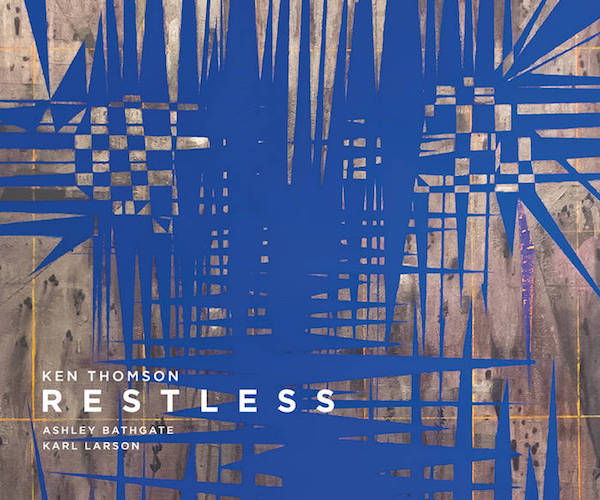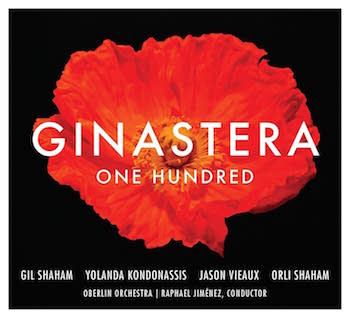CD Reviews: Ken Thomson’s “Restless” and Alberto Ginastera’s “One Hundred”
Ken Thomson’s Restless doesn’t hide from dark places or things; Oberlin Orchestra does right by Argentinian composer Alberto Ginastera.

By Jonathan Blumhofer
If there’s one recording that captures the Zeitgeist that was 2016, it may well be Ken Thomson’s Restless, a pairing of his eponymous cello/piano duo and solo-piano piece Me Vs. Here’s music that doesn’t hide from dark places or things; it embraces and explores them. If the conclusions this Cantaloupe release reaches are ambiguous or not particularly happy, well, neither are our times.
The playing on each track can be understood to fairly clearly evoke its title. Thus, the unresolved dissonances and meandering melodic line that mark the first movement of the title track build, with some predictability, to a fervent climax, highlighted by cellist Ashley Bathgate playing with fierce intensity in her lower- and middle-registers before the impulse dies down and the music drifts up and away into the ether. Similarly, “Forge,” Restless’s second movement, offers plenty of motoric, accented cello melodies punctuated by anvil-like piano chords; “Untold,” the third movement, delivers fragmented unison melodies that gradually spread out in shadowy, mysterious directions; while “Lost,” the finale, provides a searing catharsis.
Me Vs., for solo piano, maintains the visceral energy that marks Restless. Its first movement, “Turn of Phrase,” begins with icy, thudding dissonances. Gradually, individual notes emerge softly out of these hard textures and coalesce into a melodic line. By the midway point, the cluster-ish chords have become an accompaniment to this tune, now smoother in character but still harmonically pungent. Eventually, textures again become spiky as the music builds to a rhythmically dissonant conclusion.
The middle movement, “Another Second Try,” offers as much of an oasis as there is to be found on this album, with a questing melody heard around a steadily-pulsing accompaniment. The finale, “Me Vs.,” is all spirited vigor, its propulsive scales echoing a bit, every now and then, Bach, Rachmaninoff, and Ligeti.
The overall affect of the disc is, well, Restless: it’s unrelenting and searching. Both pieces explore some seriously dark emotional terrain. Assign specific themes to them at your own peril, but they’re deeply personal musical statements and, despite their rather grim affect, both are hard to look away from, from a technical and expressive angles.
Bathgate and Larson certainly have the notes of both scores in hand (no small feat, especially, for Larson, considering Thomson’s busy keyboard writing). And they also inhabit the music’s expressive turbulence with real understanding and sometimes terrifying intensity (like Bathgate’s series of brooding glissandos at the end of “Lost”).

There was a time in the ‘50s and ‘60s when it seemed that Alberto Ginastera might establish a secure place for himself in the repertory of 20th-century titans. To some degree, he did – how many other Argentine composers of the 20th (or any other) century can you name? And it’s not as though his music is completely neglected: certain works from it have found a solid place on youth concerts, at least. But his isn’t really a household name and his appearances on concert programs is, these days, unreliable, at best.
So it’s a pleasure to hear such committed and lively performances on Ginastera 100, a new disc celebrating Ginastera’s 2016 centenary from Oberlin Music. Perhaps it can play some role in reasserting Ginastera’s name and music before the concert-going public.
It certainly has prominent-enough advocates. Siblings Gil and Orli Shaham turn in a sweltering performance of Pampeana no. 1, a striking marriage of Argentine folk music with the European virtuoso violin tradition. And pianist Orli delivers a spirited rendition of 3 Danzas Argentinas, an early-period score (1937) that incorporates some vogue-ish techniques from the avant-garde of the day. She’s particularly magical in the sultry second movement, “Danza de la moza donosa.”
Meanwhile, Yolanda Kondonassis gives a commanding performance of the solo part of the Harp Concerto, perhaps Ginastera’s most-travelled work. For anyone who’s studied the harp, this is a piece that’s often held up to show just about everything the instrument can do. It’s filled to the brim with striking techniques, gestures, and sounds. Kondonassis’ reading is beautiful etched and blazingly colorful – hers is basically a master class in virtuoso harp performance.
But it’s also richly expressive. The slow movement, with its distinct echoes of Bartók, is so perfectly paced and touchingly played that, in this recording, it comes stunningly to life: like a Spanish-tinged Music for Strings, Percussion, and Celesta.
Throughout the concerto, Raphael Jiménez leads the Oberlin Orchestra in vivid accompaniment. There’s some great percussion playing in the driving finale and the balance of textures in the whole piece almost always allows the harp to come through the ensemble.
Wrapping things up is Jason Vieaux’s fantastic, gritty reading of the Sonata for Guitar. He seems to have lots of fun with the Scherzo’s many glissandos while mining the robust, bravura lyricism of the “Canto” with aplomb.
In sum, this is a wonderful survey of Ginastera’s voice and style and, for those so inclined, an excellent introduction to his output (the informative booklet essay, by James O’Leary, is a nice bonus). It’s good, too, that it’s an all-Ginastera disc – too often his music is paired with Villa-Lobos or Chavez or another South/Latin American contemporary: here Ginastera gets to shine on his own exceptional merits.
Jonathan Blumhofer is a composer and violist who has been active in the greater Boston area since 2004. His music has received numerous awards and been performed by various ensembles, including the American Composers Orchestra, Kiev Philharmonic, Camerata Chicago, Xanthos Ensemble, and Juventas New Music Group. Since receiving his doctorate from Boston University in 2010, Jon has taught at Clark University, Worcester Polytechnic Institute, and online for the University of Phoenix, in addition to writing music criticism for the Worcester Telegram & Gazette.
Tagged: Alberto Ginastera, Cantelope, Ginastera 100, Ken Thomson, Oberlin Orchestra, Raphael Jiménez. Oberlin Music
